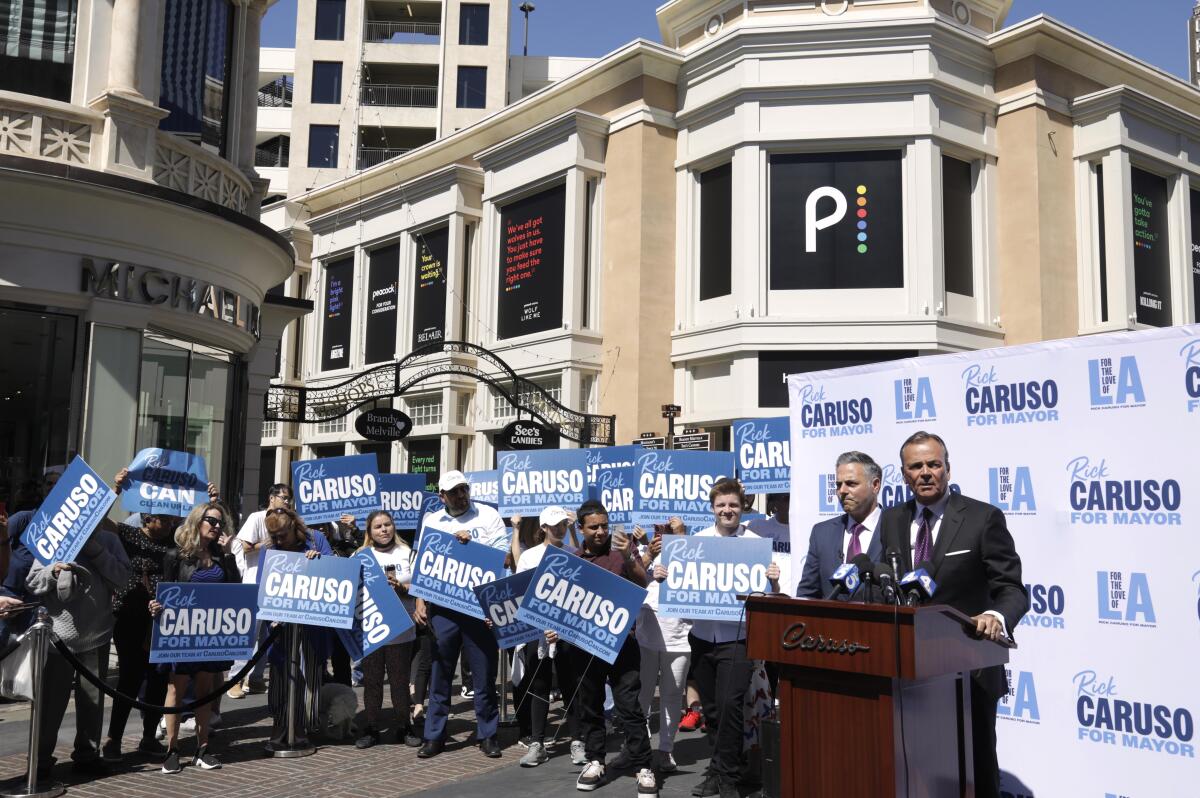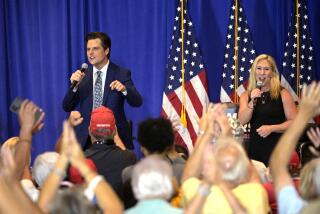Activists sue for the right to protest Caruso’s campaign at the Grove

- Share via
Two activists are suing real estate developer Rick Caruso’s company for the right to protest against the mayoral candidate at his flagship shopping mall.
The lawsuit was filed Tuesday on behalf of leftist former mayoral candidate Gina Viola, the Youth Climate Strike Los Angeles group and Sim Bilal, an organizer for that group. Bilal and Viola had been denied permission to hold anti-Caruso events at the Grove, the developer’s open-air retail complex in the Fairfax District.
Their lawyers argue that because events and speech in support of Caruso’s candidacy are allowed at the Grove, the public should be allowed to engage in similar activity opposing his candidacy.
Get the lowdown on L.A. politics
Sign up for our L.A. City Hall newsletter to get weekly insights, scoops and analysis.
You may occasionally receive promotional content from the Los Angeles Times.
The lawsuit is almost certainly intended as a political provocation during a contentious mayoral race. But it also raises legal questions about public and private spaces amid a campaign in which Caruso’s developments have been seen as proxies for his vision for the city.
“Because the Grove opened itself up to speech supportive of Caruso’s campaign, it has to provide that same opportunity to the campaign’s critics,” said attorney Matthew Strugar, who brought the lawsuit with fellow civil rights attorney Shakeer Rahman.
Peter Ragone, a spokesperson for Caruso’s campaign, described the lawsuit as “beyond frivolous and orchestrated by a failed political campaign dedicated to policies that would lead to more homelessness and defunding the police.”
A spokesperson for Caruso’s eponymously named business did not immediately return a request for comment.
Caruso’s success as a businessman developing idealized retail spaces like the Grove has been core to his campaign message, which has also centered on homelessness and public safety. The Grove’s manicured streets have provided a particularly resonant backdrop for Caruso’s “clean up L.A.” message.
L.A. mayor candidate Rick Caruso is enmeshed in a fight over plans to modernize and expand Television City, next to the Grove, his flagship property.
In late July, Bilal and Viola applied to hold separate small-scale anti-Caruso marches at the Grove this month. According to the lawsuit, Viola wanted to march with 10 to 15 people to raise issues about Caruso’s history as president of the Los Angeles Police Commission, and Bilal wanted to protest Caruso’s lack of a mayoral climate platform, accompanied by 30 to 50 people. Those applications were rejected on Aug. 3, according to the lawsuit.
Generally speaking, the 1st Amendment protects speech only from government intrusion, meaning privately owned shopping malls can extensively limit speech in most of the country. But California has more expansive rules.
In 1979, a landmark state Supreme Court decision found that the California Constitution goes beyond the 1st Amendment to protect free speech at privately owned shopping malls. A U.S. Supreme Court ruling the next year upheld the state’s right to adopt broader personal liberties than those conferred by the U.S. Constitution.
PruneYard Shopping Center vs. Robins, the case in question, centered on a group of high school students who tried to solicit petition signatures in a suburban Northern California mall on an autumn Saturday in 1975.
The teenagers complied after mall security asked them to leave — and ultimately filed a lawsuit.
The 1979 state Supreme Court decision was based in part on a principle that has been central to Caruso’s success as a developer: Malls represent a new kind of town square, where people spend a significant amount of time.
The state high court deemed malls to be public forums that should be treated as such. But speech can’t interfere with regular business operations, and malls can still adopt “reasonable regulations” about the time, place and manner of speech activities under the Pruneyard ruling.
Another 2007 California court precedent found that those regulations have to be content-neutral and viewpoint-neutral, meaning a mall can’t have different rules for different groups or different kinds of speech.
The lawsuit filed Tuesday in Los Angeles County Superior Court argues that because the Grove allows speech supporting Caruso’s mayoral campaign, barring anti-Caruso demonstrations amounts to “viewpoint discriminatory enforcement” of their regulations.
The Grove has hosted several Caruso campaign events, including gatherings with former mayoral candidates Councilman Joe Buscaino and Ramit Varma and a large party on the night of the primary election. Caruso for mayor signs are also available at the mall concierge desk. Strugar said that twice prior to filing the lawsuit, members of his team took signs from the concierge desk and paraded them around the mall without anyone stopping them.
In a letter sent to Strugar before the lawsuit was filed, the Caruso company’s general counsel wrote that Viola and Bilal’s applications “were rightfully rejected as inconsistent with the reasonable time, place, and manner rules” in the Grove’s policy regarding non-commercial use of its common areas, according to a copy of the letter provided by Strugar.
The letter, which was sent on Friday, said the company would “welcome the opportunity to discuss options” for Viola and Bilal “to engage in lawful expressive activity” consistent with the Grove’s policy and invited them to submit another application.
Aaron Caplan, a professor at Loyola Law School and a former attorney at the American Civil Liberties Union of Washington, said the plaintiffs had a strong argument, but he could see potential reasoning on both sides of the case.
The time, place, and manner rules laid out in the Grove’s policy restrict expressive activity to a limited number of people in a designated area, according to the lawsuit. Even if those policies are found to be reasonable, there’s still the question of whether campaign activity was held to the same standard, Caplan said.
“If the Grove company is saying to Mr. Caruso, ‘Sure, you can use this for your campaign,’ and then it’s telling other people, ‘No, you can’t use it for your campaign,’ that’s what we call viewpoint discrimination,” Caplan said.
But the fact that the Caruso campaign paid for use of mall space for campaign events could play into the case. The idea that holding a protest and renting space for a campaign event are not an “apples to apples” comparison would be “a good argument for the Grove to make,” Caplan said.
Still, he said, a judge might find that argument to be one-sided or overly technical, akin to suggesting that because someone is rich, they “get to have a different kind of speech at the mall than everybody else.”
More to Read
Sign up for Essential California
The most important California stories and recommendations in your inbox every morning.
You may occasionally receive promotional content from the Los Angeles Times.















